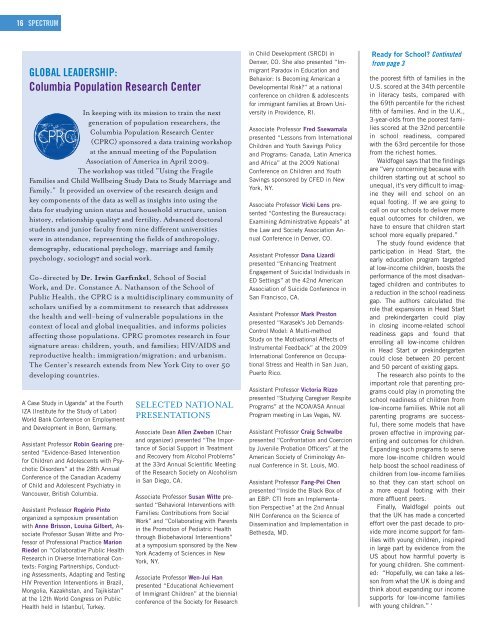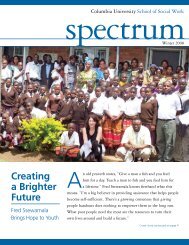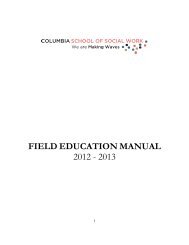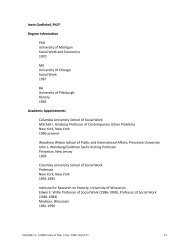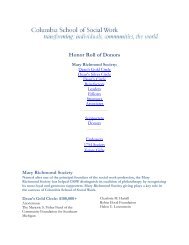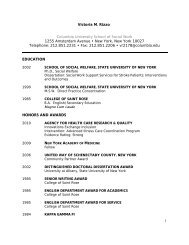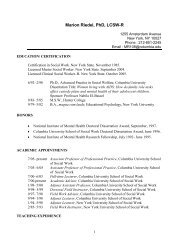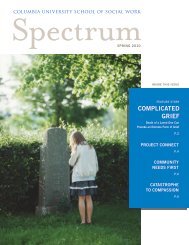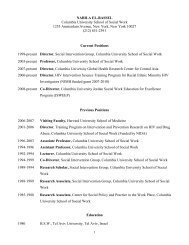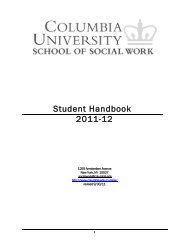Fall 2009 - Columbia University School of Social Work
Fall 2009 - Columbia University School of Social Work
Fall 2009 - Columbia University School of Social Work
Create successful ePaper yourself
Turn your PDF publications into a flip-book with our unique Google optimized e-Paper software.
16 SpectrumGlobal Leadership:<strong>Columbia</strong> Population Research CenterIn keeping with its mission to train the nextgeneration <strong>of</strong> population researchers, the<strong>Columbia</strong> Population Research Center(CPRC) sponsored a data training workshopat the annual meeting <strong>of</strong> the PopulationAssociation <strong>of</strong> America in April <strong>2009</strong>.The workshop was titled “Using the FragileFamilies and Child Wellbeing Study Data to Study Marriage andFamily.” It provided an overview <strong>of</strong> the research design andkey components <strong>of</strong> the data as well as insights into using thedata for studying union status and household structure, unionhistory, relationship quality, and fertility. Advanced doctoralstudents and junior faculty from nine different universitieswere in attendance, representing the fields <strong>of</strong> anthropology,demography, educational psychology, marriage and familypsychology, sociology, and social work.Co-directed by Dr. Irwin Garfinkel, <strong>School</strong> <strong>of</strong> <strong>Social</strong><strong>Work</strong>, and Dr. Constance A. Nathanson <strong>of</strong> the <strong>School</strong> <strong>of</strong>Public Health, the CPRC is a multidisciplinary community <strong>of</strong>scholars unified by a commitment to research that addressesthe health and well-being <strong>of</strong> vulnerable populations in thecontext <strong>of</strong> local and global inequalities, and informs policiesaffecting those populations. CPRC promotes research in foursignature areas: children, youth, and families; HIV/AIDS andreproductive health; immigration/migration; and urbanism.The Center’s research extends from New York City to over 50developing countries.A Case Study in Uganda” at the FourthIZA (Institute for the Study <strong>of</strong> Labor)World Bank Conference on Employmentand Development in Bonn, Germany.Assistant Pr<strong>of</strong>essor Robin Gearing presented“Evidence-Based Interventionfor Children and Adolescents with PsychoticDisorders” at the 28th AnnualConference <strong>of</strong> the Canadian Academy<strong>of</strong> Child and Adolescent Psychiatry inVancouver, British <strong>Columbia</strong>.Assistant Pr<strong>of</strong>essor Rogério Pintoorganized a symposium presentationwith Anne Brisson, Louisa Gilbert, AssociatePr<strong>of</strong>essor Susan Witte and Pr<strong>of</strong>essor<strong>of</strong> Pr<strong>of</strong>essional Practice MarionRiedel on “Collaborative Public HealthResearch in Diverse International Contexts:Forging Partnerships, ConductingAssessments, Adapting and TestingHIV Prevention Interventions in Brazil,Mongolia, Kazakhstan, and Tajikistan”at the 12th World Congress on PublicHealth held in Istanbul, Turkey.Selected NationalPresentationsAssociate Dean Allen Zweben (Chairand organizer) presented “The Importance<strong>of</strong> <strong>Social</strong> Support in Treatmentand Recovery from Alcohol Problems”at the 33rd Annual Scientific Meeting<strong>of</strong> the Research Society on Alcoholismin San Diego, CA.Associate Pr<strong>of</strong>essor Susan Witte presented“Behavioral Interventions withFamilies: Contributions from <strong>Social</strong><strong>Work</strong>” and “Collaborating with Parentsin the Promotion <strong>of</strong> Pediatric Healththrough Biobehavioral Interventions”at a symposium sponsored by the NewYork Academy <strong>of</strong> Sciences in NewYork, NY.Associate Pr<strong>of</strong>essor Wen-Jui Hanpresented “Educational Achievement<strong>of</strong> Immigrant Children” at the biennialconference <strong>of</strong> the Society for Researchin Child Development (SRCD) inDenver, CO. She also presented “ImmigrantParadox in Education andBehavior: Is Becoming American aDevelopmental Risk?” at a nationalconference on children & adolescentsfor immigrant families at Brown <strong>University</strong>in Providence, RI.Associate Pr<strong>of</strong>essor Fred Ssewamalapresented “Lessons from InternationalChildren and Youth Savings Policyand Programs: Canada, Latin Americaand Africa” at the <strong>2009</strong> NationalConference on Children and YouthSavings sponsored by CFED in NewYork, NY.Associate Pr<strong>of</strong>essor Vicki Lens presented“Contesting the Bureaucracy:Examining Administrative Appeals” atthe Law and Society Association AnnualConference in Denver, CO.Assistant Pr<strong>of</strong>essor Dana Lizardipresented “Enhancing TreatmentEngagement <strong>of</strong> Suicidal Individuals inED Settings” at the 42nd AmericanAssociation <strong>of</strong> Suicide Conference inSan Francisco, CA.Assistant Pr<strong>of</strong>essor Mark Prestonpresented “Karasek’s Job Demands-Control Model: A Multi-methodStudy on the Motivational Affects <strong>of</strong>Instrumental Feedback” at the <strong>2009</strong>International Conference on OccupationalStress and Health in San Juan,Puerto Rico.Assistant Pr<strong>of</strong>essor Victoria Rizzopresented “Studying Caregiver RespitePrograms” at the NCOA/ASA AnnualProgram meeting in Las Vegas, NV.Assistant Pr<strong>of</strong>essor Craig Schwalbepresented “Confrontation and Coercionby Juvenile Probation Officers” at theAmerican Society <strong>of</strong> Criminology AnnualConference in St. Louis, MO.Assistant Pr<strong>of</strong>essor Fang-Pei Chenpresented “Inside the Black Box <strong>of</strong>an EBP: CTI from an ImplementationPerspective” at the 2nd AnnualNIH Conference on the Science <strong>of</strong>Dissemination and Implementation inBethesda, MD.Ready for <strong>School</strong>? Continutedfrom page 3the poorest fifth <strong>of</strong> families in theU.S. scored at the 34th percentilein literacy tests, compared withthe 69th percentile for the richestfifth <strong>of</strong> families. And in the U.K.,3-year-olds from the poorest familiesscored at the 32nd percentilein school readiness, comparedwith the 63rd percentile for thosefrom the richest homes.Waldfogel says that the findingsare “very concerning because withchildren starting out at school sounequal, it’s very difficult to imaginethey will end school on anequal footing. If we are going tocall on our schools to deliver moreequal outcomes for children, wehave to ensure that children startschool more equally prepared.”The study found evidence thatparticipation in Head Start, theearly education program targetedat low-income children, boosts theperformance <strong>of</strong> the most disadvantagedchildren and contributes toa reduction in the school readinessgap. The authors calculated therole that expansions in Head Startand prekindergarten could playin closing income-related schoolreadiness gaps and found thatenrolling all low-income childrenin Head Start or prekindergartencould close between 20 percentand 50 percent <strong>of</strong> existing gaps.The research also points to theimportant role that parenting programscould play in promoting theschool readiness <strong>of</strong> children fromlow-income families. While not allparenting programs are successful,there some models that haveproven effective in improving parentingand outcomes for children.Expanding such programs to servemore low-income children wouldhelp boost the school readiness <strong>of</strong>children from low-income familiesso that they can start school ona more equal footing with theirmore affluent peers.Finally, Waldfogel points outthat the UK has made a concertedeffort over the past decade to providemore income support for familieswith young children, inspiredin large part by evidence from theUS about how harmful poverty isfor young children. She commented:“Hopefully, we can take a lessonfrom what the UK is doing andthink about expanding our incomesupports for low-income familieswith young children.” ‘


